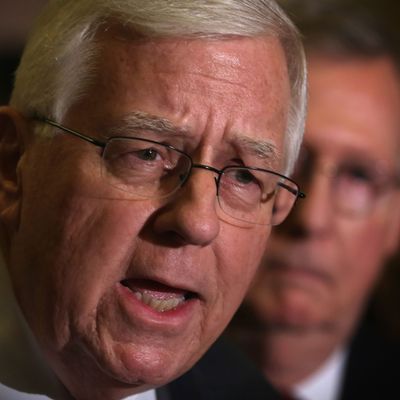
The long-awaited draft Senate budget resolution for fiscal year 2018, which is significant for its role in “setting up” tax cuts that can be enacted with only 50 votes, came out today. The most notable feature of the document were three things left out:
1. Budget neutrality: The FY 2018 budget resolution approved by the House Budget Committee back in July presumed an overall impact on the budget resolution of zero. It accomplished that small miracle by means of a combination of tax revenue offsets, spending cuts, and very optimistic economic growth estimates. The Senate didn’t bother to go for that much budget hawkery: It allows a net $1.5 trillion increase in the deficit over ten years, which the House will probably accept.
2. Big spending cuts: The House budget also provided for over $200 billion in domestic spending cuts, expected to come from low-income entitlement “reforms.” It also included language encouraging much larger cuts than those. You’d think the Senate might feel inclined to make a nod in that direction after the big Medicaid cuts in its various health-care bills never happened. But at this point the Senate’s keeping it simple with $1 billion in cuts (apparently in conjunction with abandoning some environmental projections) instead of a big assault on “big” government.
3. Obamacare repeal-and-replace authorization: Despite some aggressive talk from Lindsey Graham and Bill Cassidy (along with Graham-Cassidy co-sponsor and Budget Committee member Ron Johnson) about demanding a fresh authorization for a renewed attack on Obamacare, there’s no sign of that in the draft budget resolution. It’s notable that the talk stopped after Graham’s and Cassidy’s meeting this week with the president, who immediately started sending signals the next bite at the Obamacare apple would be in January or February, presumably with an early FY 2019 budget resolution. But that means it goes away
until then.
These measures to keep it simple don’t, of course, mean enacting and then implementing this budget resolution will be easy. As Eric Levitz explained today, the composition and distributional effects of the trillions of dollars in tax cuts Republicans are contemplating will create all sorts of substantive and political problems. And there’s no guarantee House Republicans will bend to the will of senators, either, particularly after the health-care fiasco. And any piece of large and controversial legislation with the president’s personal “brand” on it could be subject to all sorts of twists and turns down the road.
As everyone keeps staring at the 89-page resolution, small but significant items will pop up. One that’s already causing some overreaction is a provision repealing a requirement that votes on budget legislation can’t happen until CBO estimates have been posted for 48 hours. Does that kick CBO right out of the process? No: As we saw during consideration of the Graham-Cassidy bill, the only required task for CBO before a bill is voted on is a certification that it complies with the budget resolution that authorized it. The fuller, politically sensitive estimates of costs and social and/or economic impacts aren’t required, but nor are they being abolished, since congressional Democrats can always ask for them. This provision may be part of a long-term GOP effort to undermine CBO estimates, which could be especially unhelpful in a tax bill where Republicans are assuming science-fiction levels of economic growth. The CBO’s not going anywhere for the time being. But the reaction to this item is a demonstration of how heavily seeded a minefield even this simplified budget resolution will have to traverse.
All in all, this is a pretty straightforward budget resolution that keeps the vehicle for tax cuts moving down the road. But Republicans have many, many miles to travel before they can be confident the FY 2018 budget process will be any more successful than its doomed FY 2017 predecessor.






























